Patient Info
Patient Info Education






































© 2025 Plano Family Dental & Primary Family Dental
[strong form category=”27″ class=”full-width”]
Required field
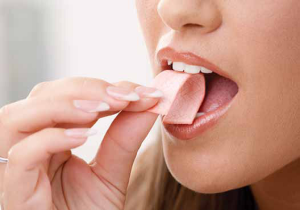 Xylitol is a sugar alcohol sweetener that is found in birch tree bark, beets, corncobs, raspberries, mushrooms, and other natural sources. Its sweetness is equal to that of sugar, but it has about 40 percent fewer calories, making it a popular sugarfree substitute. Xylitol not only cuts calories, it also
Xylitol is a sugar alcohol sweetener that is found in birch tree bark, beets, corncobs, raspberries, mushrooms, and other natural sources. Its sweetness is equal to that of sugar, but it has about 40 percent fewer calories, making it a popular sugarfree substitute. Xylitol not only cuts calories, it also
cuts cavities!
How does xylitol prevent cavities?
Xylitol helps prevent Streptococcus mutans, the primary bacterium associated with dental caries, from attaching to teeth and tissues in the mouth. Xylitol cannot be metabolized by bacteria; as a result, the process that creates harmful, enamel-eating acids is drastically slowed.Regular use of xylitol has been shown to help reduce dental plaque—the first stage of cavity development, tartar formation, and tooth staining—and promote better oral health.
How often must I use xylitol for it to be effective?
Xylitol is a natural and convenient way to supplement daily dental care.Xylitol gum or mints used three to five times daily (for a total intake of 5 grams) is considered optimal. Because frequency and duration of exposure is important, gum should be chewed for approximately five minutes and mints should be allowed to dissolve. Dentists recommend using xylitol immediately after meals and snacks to help reduce plaque, inhibit adhesion of bacteria to the teeth, and reduce contact time of sugar on teeth.
Has xylitol been evaluated for safety?
Yes. Human consumption of xylitol has been confirmed for safety by a number of agencies, including the U.S. Food and Drug Administration, the World Health Organization’s Joint Expert Committee on Food Additives, and the European Union’s Scientific Committee on Food.Pet owners should note, however, that xylitol is harmful to dogs. To prevent xylitol poisoning, dog owners should be aware of products that contain xylitol as a sweetener, and keep those products out of the reach of their dogs.
What products contain xylitol and how do I find them?
Products containing xylitol have been available in the United States for a number of years, but only recently has its use become mainstream. Today, xylitol can be readily found in chewing gums, toothpastes, mouthwashes and other oral care products, candies, and some pharmaceuticals. On food labels, xylitol is classified broadly as a carbohydrate and more narrowly as a polyol. To learn more about xylitol products, talk to your dentist.
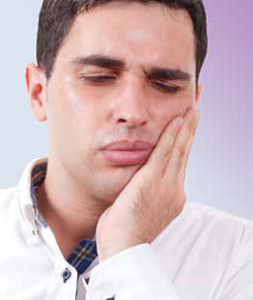 According to the National Institute of Dental and Craniofacial Research, approximately 5 to 12 percent of people suffer from temporomandibular joint dysfunction,more commonly known as temporomandibular disorder (TMD), which describes a variety of conditions affecting the joints, muscles, and nerves in the jaw. Learn more about the signs and symptoms associated with this painful problem.
According to the National Institute of Dental and Craniofacial Research, approximately 5 to 12 percent of people suffer from temporomandibular joint dysfunction,more commonly known as temporomandibular disorder (TMD), which describes a variety of conditions affecting the joints, muscles, and nerves in the jaw. Learn more about the signs and symptoms associated with this painful problem.
What are the temporomandibular joints?
Located on each side of your face, the temporomandibular joints connect your lower jaw to your skull. These joints and their accompanying muscles allow you to open and close your mouth, and to move your lower jaw from side to side. You can feel these joints by placing your fingers in front of your ears and opening your mouth.
What is TMD?
TMD occurs when the temporomandibular joint is damaged or deteriorated, or when the muscles surrounding the joint malfunction, causing imbalanced jaw movement. The chronic muscle pain and spasms associated with this condition often can be quite painful.
What causes TMD?
In many cases, the cause of the disorder is unknown. However, TMD may be caused by trauma, such as injury or dislocation, or an improper bite, which affects the chewing muscles. Stress and its related behaviors, like clenching the jaw or grinding the teeth, may aggravate the condition. TMD appears to be more common in women than men, though there is no consensus as to why that might be.
How do I know if I have TMD?
Those with TMD may experience the following symptoms on one or both sides of the face:
If you experience any of these symptoms, talk to your general dentist today. He or she can perform an examination, checking the joints and muscles in your jaw for tenderness, clicking, popping, or difficulty moving. Depending on the diagnosis, your dentist may refer you to a physician or a specialist.
How is TMD treated?
Many TMD cases can be handled with simple lifestyle modifications, including:
In more severe cases, your dentist may recommend physical therapy (exercises to strengthen the jaw muscles), appliance therapy (a splint, mouthguard, or bite plate), or medication (stronger pain relievers,muscle relaxants, anti-inflammatory drugs, antidepressants, or anti-anxiety drugs).
Is TMD permanent?
TMD is often a cyclical condition that can recur during times of stress. If you have this disorder, see your dentist for regular checkups so that he or she can monitor your symptoms and manage your care.For more information about TMD, talk to your general dentist or visit KnowYourTeeth.com.
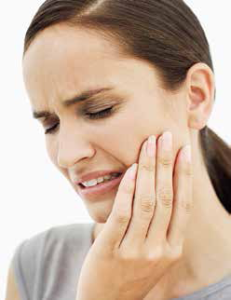 Inside your teeth is a soft material called pulp that contains blood vessels, nerves, and connective tissue. If this pulp becomes infected, it can cause severe tooth pain. In some cases, that infection will require root canal therapy.
Inside your teeth is a soft material called pulp that contains blood vessels, nerves, and connective tissue. If this pulp becomes infected, it can cause severe tooth pain. In some cases, that infection will require root canal therapy.
What is a root canal?
Nerves enter at the tip of the tooth’s roots and run through the center of the tooth in small, thin root canals, which join up in the pulp chamber. Each tooth has at least one root canal but may contain more.
Why might I need root canal therapy?
Injury or trauma to a tooth may cause the pulp to become inflamed or infected.eventually, the pulp may die. Damaged or dead pulp leads to increased blood flow and cellular activity, creating pressure inside the tooth that cannot be relieved.This may result in pain when biting down or chewing with the affected tooth, or when consuming hot or cold drinks.Without treatment, the infection may spread, the bone around the tooth may degenerate, and the tooth may fall out.
What is root canal therapy?
Root canal therapy is a procedure to remove damaged or dead pulp. After the pulp chamber and root canal are cleaned out and reshaped, the canal is filled with a rubber-like substance called gutta percha to prevent recontamination, and the tooth is permanently sealed.Treatment usually involves one to three appointments. After cleaning and reshaping, the dentist may seal the tooth with a temporary crown, leave it open to drain, or fill the canals, depending on the tooth’s condition. A topical medication also may be applied in the area to fight bacteria.Temporary fillings will be removed on subsequent visits. If the tooth is still weak
after the pulp chamber and canal are filled, a metal or fiber-reinforced resin post may be used to reinforce the tooth.Finally, the area is permanently sealed, and a gold, porcelain-fused-to-metal, or ceramic crown usually is placed over the tooth to reinforce its structure and improve its appearance.
How will I feel after treatment?
Tissue inflammation in the area may cause some discomfort. This usually can be controlled with over-the-counter pain relievers. Aftercare includes maintaining regular visits with your dentist, brushing for two minutes twice a day, flossing once a day, and avoiding chewing hard foods with the treated tooth.
Are there any potential complications?
On rare occasions, new infections may occur. This can happen for a variety of reasons, including an undetected crack in the root of the tooth, a defective restoration, or the breakdown of an inner sealing material.In these cases, additional follow-up and treatment may be necessary.
Are there any alternatives to root canal therapy?
The only alternative to root canal therapy is extraction of the infected tooth. This can eventually cause the surrounding teeth to move, which may result in a bad bite that ultimately requires an implant or bridge. It’s always best to keep your original tooth if possible, and root canal therapy allows you to do so.To learn more about root canal therapy and determine whether it’s the best option for you, talk to your general dentist.
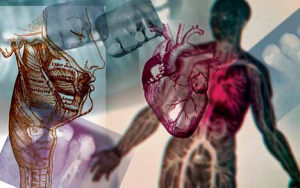 Cardiovascular disease is a class of disease that affects the heart and/or blood vessels. It is estimated that more than 80 million people in the United States have one or more forms of cardiovascular disease; these forms include high blood pressure, coronary heart disease (acute heart attack and angina pectoris), stroke, and heart failure. Studies have shown
Cardiovascular disease is a class of disease that affects the heart and/or blood vessels. It is estimated that more than 80 million people in the United States have one or more forms of cardiovascular disease; these forms include high blood pressure, coronary heart disease (acute heart attack and angina pectoris), stroke, and heart failure. Studies have shown
that there is a link between cardiovascular disease and periodontal (gum) disease, the chronic inflammation and infection of the gums and surrounding tissue. Forms of gum disease, such as gingivitis (gum inflammation) and periodontitis (bone loss), can be indicators for cardiovascular problems, which is why it is important for individuals at risk for cardiovascular disease to visit a dentist on a regular basis, practice good oral hygiene, and keep their dentist informed of any oral and overall health issues.
How are periodontal disease and cardiovascular disease connected?
It has been suggested that the inflammatory proteins and bacteria associated with gum disease enter a person’s bloodstream and can cause various effects on the cardiovascular system. A study published in the February 2005 issue of Circulation examined the presence of the bacteria known to cause periodontitis and the thickening of the blood vessel wall typically seen in heart disease. After examining samples from more than 650 participants, the investigators concluded that the presence of the same bacteria known to cause periodontitis was associated with an increased level of blood vessel thickening.
What can I do to keep my gums and heart healthy?
Practicing proper oral hygiene is essential to maintaining healthy gums. This includes flossing regularly, brushing twice a day with antibacterial toothpaste, and visiting a dentist at least every six months.A healthy diet and regular exercise can help improve both your cardiovascular health and your overall health.
What do my physician and dentist need to know?
It is important to keep all medical professionals up-to-date on your oral and overall health issues. Inform your physician if you have been diagnosed with a form of periodontal disease or are experiencing any issues with gum inflammation.Likewise, inform your dentist if you have been diagnosed with any form of cardiovascular disease, have experienced any cardiovascular problems, or have a family history of cardiovascular disease.
What other risk factors are associated with cardiovascular disease?
Individuals who are most at risk for cardiovascular disease include those over age 65, African-Americans, Hispanics, and males. While these particular factors cannot be changed, there are some risk factors that you can change through lifestyle management and/or medical treatment to reduce your risk for cardiovascular disease. These risk factors include smoking, high cholesterol, high blood pressure, physical inactivity, obesity, excessive alcohol consumption, and stress. Questions? Be sure to ask your physician and dentist.
 If you’re planning to become pregnant or suspect you’re already pregnant, it’s important that you see a dentist right away. Pregnancy may cause unexpected oral health changes due to hormones—particularly an increase in estrogen and progesterone—which can exaggerate the way in which gum tissues react to plaque. Research continues to show that overall health and oral health coincide, so it’s especially important for you to maintain good oral hygiene throughout your pregnancy. Visiting your dentist will allow him or her to assess your oral condition and map out a dental plan for the remainder of your pregnancy.
If you’re planning to become pregnant or suspect you’re already pregnant, it’s important that you see a dentist right away. Pregnancy may cause unexpected oral health changes due to hormones—particularly an increase in estrogen and progesterone—which can exaggerate the way in which gum tissues react to plaque. Research continues to show that overall health and oral health coincide, so it’s especially important for you to maintain good oral hygiene throughout your pregnancy. Visiting your dentist will allow him or her to assess your oral condition and map out a dental plan for the remainder of your pregnancy.
How does plaque build-up affect me?
When plaque isn’t removed, it can cause gingivitis—red, swollen, tender gums that are more likely to bleed. So-called “pregnancy gingivitis” affects most pregnant women to some degree and generally begins to surface as early as the second month of pregnancy. If you already have gingivitis, the condition is likely to worsen during pregnancy.Untreated gingivitis can lead to periodontitis, a more serious form of gum disease that includes bone loss.
How does gingivitis affect my baby’s health?
Research suggests a link between pre-term delivery, low birthweight babies, and gingivitis. Excessive bacteria can enter the bloodstream through your gums; the bacteria can travel to the uterus, triggering the production of chemicals called prostaglandins, which are suspected to induce premature labor.
How can I prevent gingivitis?
You can prevent gingivitis by keeping your teeth clean, especially near the gumline. You should brush with fluoride toothpaste at least twice a day and after each meal when possible. You also should floss each day. Good nutrition keeps the oral cavity healthy and strong; in particular, you should get plenty of vitamins C and B12. More frequent cleanings from the dentist also will help control plaque and prevent gingivitis.
What are pregnancy tumors?
Pregnant women are at risk for developing pregnancy tumors—inflammatory, non-cancerous growths that develop between the teeth or when swollen gums become irritated. These localized growths or swellings are believed to be related to excess plaque. Normally, the tumors are left alone and will usually shrink on their own after the baby’s birth; however, if a tumor is uncomfortable and interferes with chewing, brushing, or other oral hygiene procedures, your dentist may decide to remove it.
Are there any dental procedures I should avoid?
Routine exams and cleanings can be performed throughout pregnancy; however, non-emergency procedures should only be performed during the second trimester of pregnancy. Dental emergencies that create severe pain can be treated during any trimester, but your obstetrician should be consulted during any emergency that requires anesthesia or whenever medication is prescribed. X-rays should only be taken for emergency situations. Lastly, elective and cosmetic procedures should be postponed until after the baby’s birth.Because every woman is different, it’s best to discuss and determine a treatment plan with your dentist.
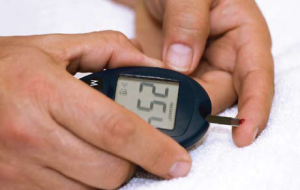 It is estimated that up to 20 million people have diabetes, but only two-thirds of these individuals are diagnosed. Studies have shown that diabetics are more susceptible to the development of oral infections and periodontal (gum) disease―than those who do not have diabetes. This relationship causes great concern because serious gum disease may have the potential to affect blood sugar control and contribute to the progression of diabetes. That’s why it’s important for people with diabetes to visit a dentist on a regular basis
It is estimated that up to 20 million people have diabetes, but only two-thirds of these individuals are diagnosed. Studies have shown that diabetics are more susceptible to the development of oral infections and periodontal (gum) disease―than those who do not have diabetes. This relationship causes great concern because serious gum disease may have the potential to affect blood sugar control and contribute to the progression of diabetes. That’s why it’s important for people with diabetes to visit a dentist on a regular basis
and to keep the dentist up to date on the status of the diabetic’s oral and overall health.
How are gum disease and diabetes related?
Because diabetes reduces the body’s resistance to infection, the gums are at risk for gingivitis, a reversible form of gum disease usually caused by the presence of bacteria. These bacteria produce toxins that create a sticky film that accumulates on teeth, both above and below the gum line, leading to inflammation. If left untreated, gingivitis can progress to periodontitis, an irreversible destruction of the tissues that surround and support the teeth.
What other problems are associated with diabetes?
Other oral problems associated with diabetes include thrush (candidiasis), an infection caused by a fungus that grows in the mouth, and dry mouth, which can cause soreness, ulcers, infections, and cavities. To prevent problems with bacterial infections in the mouth, your dentist may prescribe antibiotics, medicated mouth rinses, and more frequent cleanings.
How can I stay healthy?
Brush your teeth with an antimicrobial toothpaste containing flouride and rinse with antimicrobial mouthwash at least two times a day. People with diabetes who receive good dental care and have good insulin control typically have a better chance of avoiding gum disease.To improve their quality of life and their oral health, people with diabetes need to pay close attention to diet and exercise. People with diabetes should be sure that both their medical and dental care providers are aware of their medical history and periodontal status.To keep teeth and gums strong, those with diabetes should be aware of their blood sugar levels in addition to having their triglycerides and cholesterol levels checked on a regular basis.
What is the best time to receive dental care?
If your blood sugar is not under control, talk with both your dentist and physician about receiving elective dental care. Types of dental procedures and appointment length are dependent on the level of diabetic control. Also, schedule morning appointments because blood glucose levels tend to be more stable at this time of day. If you have a scheduled appointment, eat and take your medications as directed. See your dentist on a regular basis, keep him or her informed of your health status.
 Pacifiers can be great for children, especially during their first six months.In addition to its calming effect, pacifier use in infants can help decrease the risk of sudden infant death syndrome and aid in the development of jaw muscles. Although pacifier use is generally a healthy habit within the first two years of life, continued or improper use may ultimately have a negative impact on your child’s oral and overall health.
Pacifiers can be great for children, especially during their first six months.In addition to its calming effect, pacifier use in infants can help decrease the risk of sudden infant death syndrome and aid in the development of jaw muscles. Although pacifier use is generally a healthy habit within the first two years of life, continued or improper use may ultimately have a negative impact on your child’s oral and overall health.
Potential pacifier problems
Pacifier use typically is acceptable after an infant is 1 month old and has had sufficient time to develop a healthy breast-feeding habit. However, experts recommend that children stop using
pacifiers after age 2, when it becomes more of a habit than a developmental need. Research shows that continued pacifier use, especially after age 2, often is associated with:
Parents should aim to rid children of their pacifier habit before age 2 to avoid associated emotional and habitual attachments to the objects.
Tips for correct pacifier use
For infants, correct use and care of pacifiers must be considered. Here are a few tips:
Following these basic rules will help ensure your infant’s pacifier use is both safe and healthy.
Proper pacifier cleaning
The shape and materials of pacifiers make them susceptible to colonization by bacterial organisms, including Staphylococcus, which causes staph infections. To prevent the spread of bacteria and disease, clean your child’s pacifiers at least once a day.They can be cleaned using mild soap and water. When cleaning pacifiers, make sure to remove all excess water from the
nipple, where it can collect and cause bacterial growth. Also, pacifiers that are dishwasher safe can be cleaned easily in the dishwasher; just follow the instructions on the pacifier package.
Saying goodbye to the pacifier
For some infants, giving up the pacifier can be difficult, especially if they become emotionally attached to the habit. Parents looking to wean their children from the pacifier can begin by offering other alternatives, including:
To further help break the pacifier habit,parents also can:
For more information regarding pacifier use, talk to your doctor or dentist, and visit KnowYourTeeth.com.
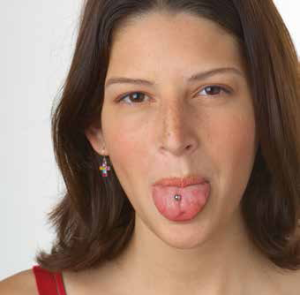 An oral piercing can cause pain, swelling, infection, drooling, taste loss, scarring, chipped teeth, and tooth loss. Most dentists discourage oral piercing because of the many health risks involved. If you’re thinking about getting an oral piercing, consider the following information.
An oral piercing can cause pain, swelling, infection, drooling, taste loss, scarring, chipped teeth, and tooth loss. Most dentists discourage oral piercing because of the many health risks involved. If you’re thinking about getting an oral piercing, consider the following information.
What should I know before I get a piercing?
Piercing regulations vary by state, so it is important to do research to find a piercer who is prepared to answer any and all questions that you may have. Be sure to ask that person about proper piercing care, possible side effects, and anything else that might concern you. If this person does not answer your questions in a clear, professional manner, go somewhere else.
What problems can piercings cause?
Fractured teeth are a common problem for people with an oral piercing. They can chip their teeth on the piercing while eating, sleeping, or talking, or by chewing on the jewelry. The fracture may go deep into the tooth, which could require a root canal or an extraction.Additionally, excessive rubbing by oral piercing jewelry can cause the gums to recede, which can cause tooth sensitivity and, in untreated cases, tooth loss.
Are there more serious complications?
It is not unusual for the tongue to swell after being punctured, but in some cases it may swell so much that it can cut off breathing. In rare cases, doctors may pass a breathing tube through a patient’s nose until the swelling subsides.Your mouth contains high levels of bacteria, and that bacteria can enter your bloodstream through the oral piercing, causing an infection in your heart or other life-threatening health problems.See your dentist at the first sign of any infection.There is also a risk of contracting infections such as human immunodeficiency virus (HIV), hepatitis, and methicillin-resistant Staphylococcus aureus (MRSA). To prevent the spread of serious infections, the piercer should use a fresh needle for every piercing, and sterilize all needles and instruments in an autoclave, which uses extreme heat for sanitization.Some people can have allergic reactions to certain materials used in piercings, which can lead to further complications.Make sure that the piercer uses the right kind of metal, such as surgical-grade stainless steel.
How do I take care of my piercing?
It will take several weeks for an oral piercing to heal. Once it’s healed, use antiseptic mouthwash after every meal and brush the jewelry in the same way you would your teeth. After your tongue heals, take the piercing out every night and brush it to remove any unseen plaque. Consider removing the piercing before eating, sleeping, or strenuous activity.If you have more questions about oral piercings, talk to your general dentist.
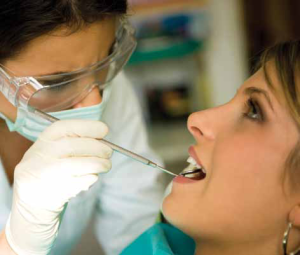 Oral cancer is a common form of cancer, with roughly 35,000 new cases reported annually in the United States. The most frequent oral cancer sites are the tongue, the floor of the mouth, the soft palate, and the tissues in the lips, gums, and back of the tongue. If not diagnosed and treated in its early stages, oral cancer can spread, leading to chronic pain, loss of oral function, irreparable facial and oral disfigurement following surgery, and even death. For this reason, it’s important to
Oral cancer is a common form of cancer, with roughly 35,000 new cases reported annually in the United States. The most frequent oral cancer sites are the tongue, the floor of the mouth, the soft palate, and the tissues in the lips, gums, and back of the tongue. If not diagnosed and treated in its early stages, oral cancer can spread, leading to chronic pain, loss of oral function, irreparable facial and oral disfigurement following surgery, and even death. For this reason, it’s important to
regularly visit your dentist so he or she can perform a thorough screening for oral cancer.
How do dentists screen for cancer?
Your dentist will screen for oral cancer during routine checkups. During the screening, he or she will feel for lumps or irregular tissue changes in your neck, head, cheeks, and oral cavity and will thoroughly examine the soft tissues in your mouth, specifically looking for sores or discolored tissues.
What causes oral cancer?
Scientists aren’t sure of the exact cause of oral cancer. However, the carcinogens in tobacco products and alcohol, as well as excessive exposure to the sun, have been found to increase the risk of developing oral cancer. Research also suggests that some forms of oral cancer may be caused by the human papillomavirus (HPV).
What are the warning signs?
Oral cancer—represented by red, white, or discolored lesions and patches or lumps in or around the mouth—is typically painless in its early stages. As the malignant cancer spreads and destroys healthy oral tissue, the lesions or lumps may become more painful. See your dentist immediately if you observe any sore that persists longer than two weeks.a swelling, growth, or lump anywhere in or about the mouth or neck; white or red patches in the mouth or on the lips; repeated bleeding from the mouth or throat; difficulty swallowing; or persistent
hoarseness.
How can I prevent oral cancer?
You can help prevent oral cancer by abstaining from all forms of tobacco use and excessive alcohol consumption.According to a study in the May/June 2007 issue of General Dentistry, the
clinical, peer-reviewed journal of the Academy of General Dentistry (AGD), vaccines that have been developed to treat HPV might decrease the risk of developing oral cancer. Because successful treatment and rehabilitation are dependent on early detection, it is extremely important to regularly check your mouth for changes in appearance and see your dentist for an oral cancer screening and regular checkup at least every six months. Survival rates greatly increase the earlier oral cancer is discovered and treated. During your next dental visit, ask your dentist to do an oral cancer screening.
 Mouth sores—they can be painful and irritating when you eat certain foods, when you bump them with your tongue or teeth, or even when you try to smile.They can be caused by ill-fitting dentures, braces, the sharp edge of a broken tooth, bacteria, a fungal or viral infection, or they can be a symptom of a disease or disorder.
Mouth sores—they can be painful and irritating when you eat certain foods, when you bump them with your tongue or teeth, or even when you try to smile.They can be caused by ill-fitting dentures, braces, the sharp edge of a broken tooth, bacteria, a fungal or viral infection, or they can be a symptom of a disease or disorder.
What are mouth sores?
Mouth sores are swollen spots or sores in your mouth, on your lips, on your tongue, or on the skin surrounding your mouth.There are several types of mouth sores, including:
Canker sores: Canker sores are small, white areas of swelling or soreness that are surrounded by redness. Canker sores are not contagious. The cause of canker sores is uncertain, but some research suggests that immune system deficiencies, bacteria, or viruses might be the culprits. Smoking, stress, trauma, allergies, certain types of foods (chocolate, caffeine, or acidic foods), or vitamin deficiencies also may make you more susceptible to canker sores. Canker sores usually heal within one week, but they can recur. And, while there is no cure for canker sores, overthe- counter topical ointments or gels that provide temporary pain relief are available. Antimicrobial mouth rinses also may help to relieve pain.
Cold sores: Often, people confuse canker sores with cold sores (also called fever blisters). Cold sores are groups of often-painful blisters filled with fluid that appear around the lips and sometimes under the nose. A person usually experiences his or her first cold sore infection in childhood. Once a person has had a cold sore, the virus stays in the body and can become active throughout the person’s life. Cold sores are extremely contagious and usually are caused by herpes simplex virus. Infection may be brought on by decreased immune response, lack of sleep, stress, or trauma. Cold sore blisters usually heal within seven to 10 days. While there is no cure for cold sores, non-prescription topical anesthetics for temporary pain relief are available. Your dentist or physician also might prescribe an antiviral drug to reduce the infection.
Leukoplakia: Leukoplakia appears on the inner cheeks, gums, or tongue and often appears as a thick, white-colored patch. It is associated with smoking or smokeless tobacco use. Other causes can include poorly fitting dentures, broken teeth, and cheek chewing. It is extremely important to report any signs of leukoplakia to your dentist or physician because an estimated
5 percent of cases of leukoplakia lead to cancer. Leukoplakia usually dissipates after the behavior causing the leukoplakia is ceased (stopping smoking or removing ill-fitting dentures, for example). Your dentist will check your healing progress every few months depending on the type, area of your mouth, and size of the affected area.
Candidiasis: Candidiasis is a fungal infection that also is called oral thrush.Candidiasis appears as yellow-white or red patches in your mouth. Oral thrush is most common in newborns or in people whose immune systems are not functioning properly. People who have dry mouth or who are taking antibiotics also may be susceptible. It is found in people who wear dentures, as well. Candidiasis may form at the corners of the mouth with poor-fitting dentures. In these individuals, outbreaks of oral thrush can be prevented by cleaning the dentures and by removing them at night, if recommended by their dentist. If antibiotics cause the condition, your physician may consider reducing the dosage or changing the treatment. For those with dry mouth, saliva substitutes are available.Antifungal medications also are available.
Oral cancer: Oral cancer often starts as a tiny white or red spot or sore. Sometimes oral cancer presents itself as a sore that bleeds easily or does not heal. Or, it can be a lump or a thick or rough spot. It can affect any area of the mouth, including the lips, gums, tongue, and hard or soft palate. If you have pain, tenderness, or numbness anywhere in the mouth or on the lips that does not go away after a week, talk to your dentist. Oral cancer most often affects people who use tobacco.If you use tobacco, talk to your dentist or physician about tobacco cessation treatment plans. Also, your dentist can check your mouth (and probably does) for oral cancer very easily and quickly during your routine cleaning and exam. Ask your dentist if he or she performs oral cancer screenings to be sure.
Should I be concerned?
Mouth sores are common and rarely cause complications. Most go away in about a week, but it’s important to monitor any mouth sores you develop. If you are concerned, or if the sore doesn’t seem to be healing, contact your dentist or other medical professional for an examination.
 Due to advances in medicine and an increase in prolonged life expectancy, the number of older people will continue to increase worldwide. It is essential that all older adults practice and maintain good oral hygiene due to the high correlation between oral health and general health.
Due to advances in medicine and an increase in prolonged life expectancy, the number of older people will continue to increase worldwide. It is essential that all older adults practice and maintain good oral hygiene due to the high correlation between oral health and general health.
How should I care for my teeth as I get older?
Maintaining good oral health is not only vital to your systemic health—it can keep you smiling well into retirement. Brushing at least twice a day with fluoridated toothpaste and a soft-bristle brush is as important as ever. Flossing is very important, too—it helps to remove plaque from between teeth and below the gumline that your toothbrush cannot reach.
Am I more prone to certain oral conditions as I age?
As you age, you may be more likely to develop gingivitis. Gingivitis is caused by the bacteria found in plaque that attack the gums. Symptoms of gingivitis include red, swollen gums and bleeding when you brush. If you have these symptoms, see a dentist.Gingivitis can lead to periodontal disease if problems persist. In the worst cases, bacteria form in pockets between the teeth and gums, weakening the bone and causing the gums to recede, pulling back from teeth. This can lead to tooth loss if left untreated.As you age, changes in salivary flow and content may further lead to gingivitis, as well as cavities. Because approximately 80 percent of all American adults suffer from some form of gingivitis, it’s important to see your dentist twice a year for regular cleanings and checkups. If regular oral care is too difficult for you (see below), your dentist can provide alternatives to aid in brushing and flossing.
What if arthritis makes brushing too difficult?
Certain dental products are designed to make dental care less painful for people who have arthritis. It is sometimes recommended that people with arthritis try securing their toothbrush to a wider object, such as a ruler, to ease arthritic hand pain while brushing. Electric toothbrushes also can help by doing some of the work for you. Ask your dentist for other suggestions.
What are the signs of oral cancer?
Oral cancer is one of the most common cancers, with roughly 35,000 new cases reported annually in the United States.Oral cancer most often occurs in people who are older than age 40. Oral cancer can form in any part of the mouth or throat. If not diagnosed and treated in its early stages, oral cancer can spread, leading to chronic pain, loss of function, irreparable facial and oral disfigurement following surgery, and even death. Oral cancer has one of the lowest five-year survival rates of all cancers; this is primarily due to late diagnosis. See a dentist immediately if you notice any of the following: red or white patches on your gums or tongue, a sore that fails to heal within two weeks, bleeding in your mouth, loose teeth, problems or pain swallowing, or a lump in your neck. Your dentist should perform a head and neck exam to screen for oral cancer during routine checkups.
What can I do about dry mouth?
As you age, you may develop dry mouth.Dry mouth (xerostomia) happens when salivary glands fail to work due to disease, certain medications, or cancer treatment.The condition can make it hard to eat, swallow, taste, and speak. Drinking lots of water and avoiding sweets, tobacco, alcohol, and caffeine are some ways to fight dry mouth. Your dentist also can prescribe medications to ease the symptoms of severe dry mouth.
What else can I do to maintain good oral health?
Studies have shown that maintaining a healthy mouth may keep your body healthier and help you to avoid diabetes, heart disease, and stroke. Older patients who are planning to enter a nursing home should inquire about on-site dental care. People who do not have teeth still need to visit the dentist regularly, since many aspects of oral health, such as adjusting dentures and oral cancer screenings, can be handled during routine dental visits. The best way to achieve good oral health is to visit your dentist at least twice a year.
Xerostomia is a condition related to the salivary glands, which help keep the mouth moist, thus preventing decay and other oral health problems. When the salivary glands do not work properly, the amount of saliva in the mouth decreases, resulting in xerostomia—or, as it’s more commonly known, dry mouth.
What causes dry mouth?
Prescription and over-the-counter medications are the most common cause of dry mouth. There are more than 400 medications that can contribute to mouth dryness, including antihypertensives, antidepressants, painkillers, tranquilizers, diuretics, and antihistamines.Dry mouth also can be caused by radiation therapy and chemotherapy, hormonal alterations, or diseases, such as diabetes, lupus, Alzheimer’s disease, and kidney disease. Other contributing factors include stress, anxiety, depression, nutritional deficiencies, and dysfunction of the immune system, as is seen in individuals with HIV/AIDS.
How important is saliva?
Saliva is vital to everyday processes such as tasting, swallowing, speaking, and digesting. Saliva is a natural defense for teeth. Without saliva, teeth are vulnerable to tooth decay and bacterial, fungal, and viral infections. Human saliva is composed mostly of water but also includes electrolytes, mucus, antibacterial compounds, and various enzymes.The components of saliva play a major role in keeping your mouth healthy by rinsing away food particles, neutralizing harmful acids, and providing enzymes to help digest food.
What are the signs and symptoms of dry mouth?
Symptoms of dry mouth may include the following:
How can my dentist help?
If you exhibit any of the symptoms of dry mouth, it’s important to contact your dentist so that he or she can properly evaluate and diagnose the condition. A variety of methods are available to help patients manage dry mouth. Your dentist may recommend using saliva substitutes and over-the-counter mouthwashes, gels, and sprays. To ease discomfort, your dentist also may recommend brushing and flossing twice a day, chewing sugarless gum, drinking plenty of water, and maintaining regular dental visits. In addition, your dentist may suggest that you change your diet, avoiding alcohol, caffeine, smoking, citrus juices, dry foods, and overly salty foods. For more information, talk with your dentist.
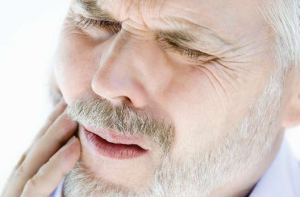 What is dentin hypersensitivity?
What is dentin hypersensitivity?
Dentin hypersensitivity, more commonly referred to as sensitive teeth, can be defined as short, sharp pains that come from exposed dentin (the layer of tissue found beneath the hard enamel that contains the inner pulp). Individuals with sensitive teeth may find that the pain can be triggered by hot, cold, sour, or sweet beverages or foods, forceful brushing or flossing, or even by cold air.
What causes the sensitivity?
Tooth sensitivity is caused by the movement of fluid within tiny tubes (pores) located in the dentin, which results in nerve irritation. When the hard enamel of a tooth is worn down or gums have receded, the surfaces of these tiny tubes can become exposed, resulting in pain while eating or drinking certain foods, such as ice cream or hot coffee.
How common is this condition?
Dentin hypersensitivity is one of the most common complaints among dental patients. One in five people in the United States experience dentin hypersensitivity at some point in his or her life.
How can I avoid dentin hypersensitivity?
Excessive consumption of acidic beverages, such as orange juice or cola, can wear down hard enamel and put you at risk for dentin hypersensitivity. Limiting your consumption of acidic foods and beverages can prevent the erosion of hard enamel. Conditions such as bulimia nervosa and acid reflux also can have similar erosive effects on tooth enamel.Abrasion of the enamel from aggressive use of a toothbrush also can lead to dentin hypersensitivity. Notify your dentist if you experience tooth sensitivity. He or she can monitor the condition and can
help remedy the sensitivity.
I have dentin hypersensitivity.What can I do to prevent pain?
Using a soft-bristled toothbrush and brushing in a circular motion will minimize enamel abrasion and thus reduce sensitivity. Using toothpaste containing a desensitizing agent that protects exposed dentin by blocking the tubes connected to nerves can alleviate pain. In-office
treatments, such as topical agents or sealants, can be applied by a dentist to help reduce sensitivity. Of course, limiting your intake of acidic foods and beverages is always recommended.
What other issue might be associated with dentin hypersensitivity?
Research suggests that sensitivity in the mouth may be associated with sensitivity in other areas. A study published in the 2002 November/December issue of General Dentistry examined 47 individuals with dentin hypersensitivity and found that all participants showed sensitivities in another area such as sight, hearing, taste, smell, or touch. Sight sensitivity, specifically to sunlight, was the most common association.
 Your dentist can apply sealants easily, and it takes only a few minutes to seal each tooth.
Your dentist can apply sealants easily, and it takes only a few minutes to seal each tooth.
In addition to good oral hygiene, including brushing and flossing, there are other ways to protect teeth from decay. Dental sealants can protect teeth and seal them off from decay-causing bacteria.
What are dental sealants?
Dental sealants are made of plastic and are applied to the chewing surfaces of the back teeth to prevent decay. The plastic fits into the depressions and grooves (pits and fissures) of teeth. The sealants protect tooth enamel from the bacteria and acids that cause decay.
Why can’t I just brush and floss?
While brushing and flossing help to remove food particles and plaque from smooth surfaces of teeth, toothbrush bristles often can’t reach into the teeth’s depressions and grooves. Sealants protect those areas and prevent food and bacteria from getting in.
How does the dentist apply a sealant?
Your dentist can apply sealants easily, and it takes only a few minutes to seal each tooth. The dentist first cleans the teeth that will be sealed, which may require the use of a dental drill to open the grooves of the teeth and determine if decay is present. Then he or she will roughen the chewing surfaces with an acid solution, which will help the sealant stick to the teeth. The dentist then “paints” the sealant on the tooth. It bonds directly to the tooth and hardens. Sometimes your dentist will use a special curing light to help the sealant harden.
Aren’t sealants just for kids?
Decay can begin early in life, so dentists usually apply sealants to children’s and teenagers’ premolars and molars to protect them. But sealants can protect adults’ teeth, too. Ask your dentist about sealants for your children or for yourself to see if they would be beneficial.
How long do they last?
As long as the sealant remains intact, the tooth surface will be protected from decay. Sealants hold up well under the force of normal chewing and usually last several years before a reapplication is needed. The risk of decay decreases significantly after sealant application. During your regular dental visits, your dentist will check the condition of the sealants and reapply them when necessary.
Are sealants safe?
Sealants are extremely safe, though some people may have an allergic reaction to the plastic. Talk to your dentist if you or your children have allergies so that he or she can provide the best treatment options.
Will my insurance pay for sealants?
Health insurance usually will pay for sealants for children’s and teenagers’ permanent molars. If the dentist suggests sealants for other teeth, he or she will tell you whether or not the costs will be covered. Be sure to check with your dental insurance company about your insurance plan as coverage may vary.
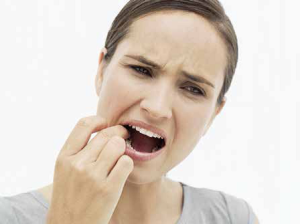 Dental emergencies can happen at any time. Oral injuries can be painful and should be treated by your dentist as soon as possible. Learn more about what to do during a dental emergency.
Dental emergencies can happen at any time. Oral injuries can be painful and should be treated by your dentist as soon as possible. Learn more about what to do during a dental emergency.
What are dental emergencies and how can I avoid them?
A dental emergency is when your tooth breaks, cracks, becomes loose, or is knocked out completely. Sometimes, a dental crown can come off your tooth, or your lips, gums, or cheeks can be cut.Some emergencies can be avoided if you take simple precautions, such as wearing a mouthguard while you’re playing sports and avoiding hard foods that can crack or
break your teeth.
What should I do if my tooth is knocked out?
Your tooth will have the best chance of surviving trauma if you see your dentist within one hour of the incident—so call immediately for an appointment. Handle your displaced tooth by its crown (the top), not by its root (the pointed part on the bottom). Touching the root of your tooth can damage the cells that are necessary to reattach your tooth to the bone. Gently rinse your tooth in water to remove dirt. Do not scrub! Then place your clean tooth in your mouth between your cheek and gum to keep it moist. If it is not possible to store your tooth in your mouth, wrap it in a clean cloth or gauze, and immerse it in milk or saline solution (used for contact lenses). If your child has knocked out a baby tooth, the tooth should not be replanted. However, your child should visit the dentist immediately to ensure no broken pieces of the tooth remain in his or her mouth.
What should I do if my tooth is pushed out of position?
If your tooth is loose and pushed out of position, call your dentist right away to schedule an emergency appointment. In the meantime, you can attempt to reposition the tooth to its normal alignment using light finger pressure—but don’t force it!
How should I handle a chipped or fractured tooth?
There are different types of tooth fractures.Chipped teeth are minor fractures, while damage to your enamel, tissue, and/or pulp indicates a moderate fracture. Sustaining a severe fracture usually means that your tooth has been traumatized to the point that it cannot be saved. If you fracture a tooth, rinse your mouth with warm water and use an ice pack or cold compress to reduce the swelling. Also, take ibuprofen—not aspirin—for pain, and call your dentist to schedule an appointment as soon as possible. Your dentist can smooth minor tooth fractures, but some fractures may require restorative procedures. If you can find the broken tooth fragment, bring it with you to the dentist.
What should I do if the tissue in my mouth is injured?
Serious injuries inside your mouth include tears or cuts, puncture wounds, and lacerations to your cheeks, lips, or tongue.Any wound to the inside of your mouth should be cleaned with warm water, and you should contact your dentist immediately.If you can’t see your dentist right away, you should go to a hospital.If you or someone you know sustains a dental injury, it’s important to contact your dentist right away. For more information about dental emergencies, speak with your general dentist.
 Dental emergencies can happen at any time. You and your children risk breaking teeth or injuring your mouth while eating, playing, exercising, and participating in other seemingly harmless activities, especially during the summer months. Oral injuries often are painful and should be treated by a dentist as soon as possible.Learn more about what to do in case of a dental emergency.
Dental emergencies can happen at any time. You and your children risk breaking teeth or injuring your mouth while eating, playing, exercising, and participating in other seemingly harmless activities, especially during the summer months. Oral injuries often are painful and should be treated by a dentist as soon as possible.Learn more about what to do in case of a dental emergency.
What are dental emergencies and how can I help my children avoid them?
Dental emergencies occur when the tooth breaks, cracks, becomes loosened, or is knocked out completely. Emergencies also include crowns coming off teeth or injuries to mouth tissue. You can help your children avoid dental emergencies by taking simple precautions, including making sure they wear mouthguards during sports activities and avoid foods that could crack or break the teeth.
What should I do if my child’s tooth is knocked out?
Your child’s tooth will have the best chance of surviving dental trauma if you see your dentist within one hour of any emergency—so call immediately for an appointment. Handle the tooth by the crown (the top), not by the root (the pointed part on the bottom); touching the root could damage cells that are necessary to reattach the tooth to the bone.Gently rinse the tooth in water to remove dirt, but do not scrub it. Place the clean tooth in your child’s mouth between the cheek and gum to keep it moist. It is important not to let the tooth dry out, so if your child can’t keep it in his or her mouth, wrap it in a clean cloth or gauze and immerse it in milk or the child’s own saliva until you get to your dentist’s office.If your child has a baby tooth knocked out, the tooth should not be replanted.However, your child should visit the dentist immediately to ensure no broken pieces of the tooth remain.
What should I do if my child’s tooth is pushed out of position?
Call your dentist right away for an emergency appointment. In the meantime, attempt to reposition your child’s tooth to its normal alignment using light finger pressure—but don’t force it.
What should I do if my child’s tooth is chipped or fractured?
There are different types of tooth fractures. Chipped teeth are minor fractures. Moderate fractures involve damage to the enamel, tissue, and/or pulp. A severely fractured tooth usually
has been traumatized to the point that it cannot be recovered.If your child fractures a tooth, rinse his or her mouth with warm water and use an ice pack or cold compress to reduce swelling. Contact your dentist immediately. He or she can smooth minor tooth fractures with a sandpaper disc, but some fractures may require restorative procedures. If you can find the broken tooth fragment, bring it with you to the dentist.
What should I do if tissue in my child’s mouth is injured?
If your child experiences a tear, cut, puncture wound, or laceration on his or her cheek, lips, or tongue, immediately clean the wound with warm water. Bleeding from a tongue laceration can be reduced by pulling the tongue forward and using gauze to place pressure on the wound.Visit an oral surgeon for emergency care as soon as possible, or go to the emergency room if you cannot see an oral surgeon right away.
 Going to the dentist can cause anxiety, and that’s a normal reaction. You can overcome this fear by educating yourself and talking with your dentist and the dental team. Read on to learn more about dental anxiety and what you can do to overcome your fears.
Going to the dentist can cause anxiety, and that’s a normal reaction. You can overcome this fear by educating yourself and talking with your dentist and the dental team. Read on to learn more about dental anxiety and what you can do to overcome your fears.
Why do people experience dentistry-related anxiety?
There are many causes of dental anxiety.Among them are:
How can my dentist help?
Staff members at your dentist office have been trained to help you understand what you can expect during a procedure or appointment. If you better understand what is going to happen
during your visit, it will help to ease your anxiety. So ask lots of questions and request informational materials prior to treatment.
What can I do to relax?
Before your appointment, it’s best to avoid caffeine and sugar, which can increase anxiety. While you are in the waiting room, distract yourself: browse through magazines, listen to music via your headphones, or watch television if one is available. Prior to treatment, share any concerns you have with your dentist.While you are receiving treatment, focus on your breathing—don’t hold your breath. When you do so, your oxygen levels decrease, which increases anxiety. If you require follow-up care, schedule your appointment at a time that is convenient for you, so you won’t feel rushed. Also, if you have questions about your treatment after you return home, call your dentist. It’s better to ask than to just wonder or worry. Talking with your dentist will likely ease your concerns.
What if my self-relaxation attempts don’t work?
Prior to your appointment, you can ask your dentist about sedation. There are different types of sedation methods. The most common are inhaled (breathing in a mixture of nitrous oxide and oxygen) and oral (taking a medication by mouth). Another type is intravenous (IV) sedation. Sedation will make you feel more relaxed, even sleepy. Sedation is safe when administered by a trained dentist, but it’s important that you talk with your dentist about any potential risks.Make sure to talk with your dentist if you’re experiencing anxiety before, during, or after your dental appointments. He or she can provide helpful tips or treatment to make your trip to the dentist more enjoyable.
 It’s important for children to visit the dentist early to ensure they are off to a good start with their oral health. The first dental visit is an extremely important step in a child’s life long oral health.
It’s important for children to visit the dentist early to ensure they are off to a good start with their oral health. The first dental visit is an extremely important step in a child’s life long oral health.
When should my child first see a dentist, and why?
The ideal time for a child to visit the dentist is six months after the child’s first (primary) teeth erupt—and no later than his or her first birthday. This time frame is a perfect opportunity for the dentist to examine carefully the development of the child’s mouth. Because dental problems
often start early, the sooner the child visits the dentist, the better. The dentist also can provide or recommend special preventive care to protect against problems, such as early childhood tooth decay, teething irritations, gum disease, and prolonged thumb- or pacifier-sucking.
How do I prepare my child and myself for this first visit?
Before the visit, ask the dentist about the procedures that will take place during the first appointment so there are no surprises. Plan a course of action for any possible reactions your child may have.Very young children may be fussy and not want to sit still. Others may become
very frightened and cry. Some children may not react negatively at all. Some may enjoy the appointment very much! Make the upcoming appointment something for your child to look forward to. Help your child understand what will happen during the visit. There are a number of children’s books about going to the dentist. Read these books with your child before his or her first visit to familiarize your child with what will happen at the dentist and help lessen any
potential anxiety.Also, be sure to bring records of your child’s complete medical history for his or her dental file.
What happens during the first visit?
Often a first visit is simply a time to acquaint your child with the dentist and the practice. As a parent, you should reassure your child that the visit is not scary or something about which to be afraid. Short, successive visits can build the child’s comfort with the dentist and the dental office.Your child’s appointment should be scheduled earlier in the day, when your child is alert and refreshed. You may need to sit in the dental chair and hold your child during the first examination. The first visit usually lasts between 15 and 30 minutes and may include any of the following, depending on the child’s age:
When should we schedule the next appointment?
Children, like adults, should see the dentist every six months. When your child is very young, some dentists may schedule interim visits every three months in order to build the child’s comfort and confidence levels or for treatment needs.If you have questions about your child’s
dental needs, please talk to your dentist.
 February is Children’s Dental Health Month. Has your child seen a dentist? Taking your child to the dentist at an early age is the best way to prevent oral health problems. A trip to
February is Children’s Dental Health Month. Has your child seen a dentist? Taking your child to the dentist at an early age is the best way to prevent oral health problems. A trip to
the dentist also can educate you on how to properly care for your child’s teeth and to identify his or her dental needs. Early visits will help to familiarize your child with the dental office, too,which helps to reduce anxiety and fear, and make visits more stress-free in the future.
Can tooth decay affect infants?
Yes. Tooth decay in infants and young children most often occurs in the upper front teeth. This decay, commonly referred to as “baby bottle tooth decay,” is caused by prolonged exposure of a child’s teeth to liquids containing sugars. Your dentist can tell you more about what you can do to help prevent the development of this condition.
When should my child first see a dentist?
The ideal time is six months after your child’s first (primary) teeth erupt or by the child’s first birthday. This time frame is the perfect opportunity for the dentist to carefully examine the development of your child’s mouth. Your dentist may even provide or recommend special preventive care to thwart oral health problems.
How can I protect my child’s oral health?
Parents should provide their child’s oral hygiene care until the child is old enough to take responsibility for the daily routine of brushing and flossing.A proper regimen of preventive home care is important from the day your child is born. To help prevent tooth decay,talk to your dentist and follow the tips below:
Does the AGD offer any resources for my family?
Yes! Check out the Academy of General Dentistry’s (AGD) consumer Web site, www.KnowYourTeeth.com—the Internet’s go-to resource for all things dental.Areas of the Web site include a dental diary with helpful calendar reminders, useful articles on dental care and oral health for patients of all ages, a “Life of a Tooth” animated timeline that explains how the teeth and mouth change over a lifetime, a dental advisor to whom you can pose questions, information on finding a highly qualified general dentist for your family, and much more!
 Tooth decay is the most common chronic disease among children, and,unfortunately, children who develop cavities in their baby teeth are more likely to develop cavities in their permanent teeth, as well. Protect your child from tooth decay and other oral health issues by taking steps to care for your child’s teeth throughout his or her childhood.
Tooth decay is the most common chronic disease among children, and,unfortunately, children who develop cavities in their baby teeth are more likely to develop cavities in their permanent teeth, as well. Protect your child from tooth decay and other oral health issues by taking steps to care for your child’s teeth throughout his or her childhood.
How I can protect my child from tooth decay?
Prolonged exposure to sugar-containing liquids can cause tooth decay in children,so limit your child’s consumption of sugary beverages like soft drinks or sweetened fruit juice. If you give your child a sippy cup for long periods of time, fill it only with water and don’t allow him or her to take it to bed.Children should learn to drink from a regular cup as early as possible; liquid is
less likely to collect around the teeth that way. You also should limit your child’s consumption of sugary or starchy snacks,especially those that can remain stuck in the teeth after eating.
When should my child see a dentist?
The best way to prevent oral health problems is to take your child to a dentist regularly. After your child’s first dental visit—which should occur six months after the child’s first tooth erupts or by the child’s first birthday—he or she should see the dentist every six months.Some dentists schedule appointments for very young children every three months; early visits will help familiarize your child with the dental office, reducing anxiety and making future visits less stressful. In addition to examining the development of your child’s mouth, the dentist can teach you how to ensure good oral health and recommend special preventive care if necessary.
How can I promote my child’s oral health at home?
A proper at-home oral health care regimen is important. Parents should care for their child’s oral hygiene until the child is old enough to take responsibility for the daily routine of brushing and flossing. To help promote good oral health, follow these simple steps:
 Halitosis, or bad breath, affects more than 80 million people in the United States. In most cases, people with bad breath aren’t even aware of the problem.Halitosis has a significant impact, both personally and socially, on those who suffer from it. If you think that you suffer from bad breath, your dentist can help determine the source of the odor.If your dentist believes that the problem
Halitosis, or bad breath, affects more than 80 million people in the United States. In most cases, people with bad breath aren’t even aware of the problem.Halitosis has a significant impact, both personally and socially, on those who suffer from it. If you think that you suffer from bad breath, your dentist can help determine the source of the odor.If your dentist believes that the problem
is caused from a systemic (internal) source, such as an infection, he or she may refer you to your family physician or a specialist to help treat the cause of the problem.
What causes bad breath?
Typically, bad breath originates in your gums and tongue. It is caused by waste from bacteria in the mouth (typically called periodontal disease), decayed food particles, other debris in your mouth, and bad oral hygiene. The decay and debris produce a chemical compound that causes the unpleasant odor. Bad breath may occur in people who have a medical infection, diabetes, kidney failure, or a liver malfunction. Even stress, dieting, snoring, age, and hormonal changes can have an effect on your breath. Xerostomia (dry mouth) and tobacco also contribute to the problem.
What is morning breath?
Saliva is the key ingredient in your mouth that helps keep odor under control because it helps wash away odor-causing food particles and bacteria. When you sleep, however, salivary glands slow the production of saliva, allowing bacteria to grow inside the mouth, which causes the bad odor, or “morning breath.” To alleviate morning breath, brush your teeth and eat a morning meal. Morning breath also is associated with hunger or fasting. If you skip breakfast, the odor may reoccur—even if you’ve brushed your teeth.
Do certain foods or drinks cause bad breath?
Very spicy foods, such as onions and garlic,and drinks like coffee may be detected on a person’s breath for up to 72 hours after digestion. In addition, certain diets,especially ones that eliminate carbohydrates,increase the chances of halitosis.
How can I control bad breath?
Visit your dentist regularly because checkups will help detect any systemic causes. Checkups also help to get rid of the plaque and bacteria that build up on your teeth.It is important to practice good oral hygiene, including brushing and flossing your teeth at least twice a day to remove bacteria, plaque, and food particles. To alleviate odors, clean your tongue with your toothbrush or a tongue scraper (a plastic tool that scrapes away bacteria that builds on the tongue).In addition, be sure to drink plenty of water. Try chewing sugar-free gum that contains xylitol—it also may help control odor. If you have dentures or a removable appliance, such as a retainer or mouthguard,clean the appliance thoroughly before placing it back in your mouth.
Before you use mouthrinses or deodorizing sprays or tablets, talk with your dentist, because some of these products do little to eliminate bad breath. Instead,your dentist can recommend products that have proven successful.

